10 years of SOC: Through companionship we tear down the feeling of loneliness, and gain a sense of belonging and everyday growth
WORKING WITH THE LGBTI COMMUNITY
Building the LGBTI Community through Activities by SOC
Sarajevo Open Centre, among many other things, also deals with strengthening the community through different work with LGBTI persons. Owing to our events for the community, many people had a chance to be themselves for the first time without fear or judgement. This way of getting together and exchanging experience, knowledge, hopes and ideas only grew in strength and now gathers a team that has been here for a long time, but is accepting new members all the time. Nikola Kuridža is writing about SOC work with the LGBTI community.
By Nikola Kuridža
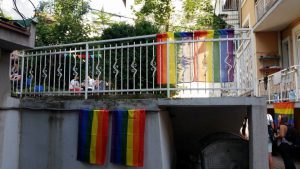 The building of a community is a fundamental activity. Without a constructed community not a single movement, especially the one for accessing equal rights for LGBTI persons, can be successful. Strengthening the LGBTI community leads to overall improvement of the rights of LGBTI persons. To me, working with the community means being able to create a new way of association and trust.
The building of a community is a fundamental activity. Without a constructed community not a single movement, especially the one for accessing equal rights for LGBTI persons, can be successful. Strengthening the LGBTI community leads to overall improvement of the rights of LGBTI persons. To me, working with the community means being able to create a new way of association and trust.
Strengthening the community is a constant and often strenuous business, but all the effort comes back through successfully beaten fears, blocks and seemingly unsolvable problems of gays, lesbians, transgender, bisexual or intersexual persons. And it is all worth it in the end since empowered persons are the ones changing the society.
The concept itself of getting together with the community is ever changing and adapting to the needs of the community. SOC opens its door to everyone who is well-meaning, and our premises are always filled with the air of support, trust and safety, as well as freedom and openness. We are happy that we can work with the LGBTI community from all over Bosnia and Herzegovina, since the life of LGBTI persons is more difficult outside big cities.
The empowerment process is continued through the process of peer to peer counselling which opens up the possibility for individual support regardless of the problem someone faces. Sometimes all that is important is to share one’s worries and they instantly become smaller. We also offer psychological counselling, giving our community the possibility for significant empowerment and building through our services and joint activities.
We’re not alone
From this point of view, it seems that the LGBTI community in Sarajevo, and in Bosnia and Herzegovina is only going to get stronger and become an important social category to count on when making decisions. I am immeasurably happy about that. The question is only when we will reach the crucial moment in this process, but getting there is not questionable at all. The strength lies within solidarity and alliance. Through our work with the community, we also work on ourselves, knowing that the chain is only as strong as its weakest link.
One of the most important things we get from getting together with people from our community is breaking down the feeling of loneliness and understanding that we are not alone, that we belong somewhere and that there is someone who understands what we have been through. Solidarity among the down-trodden has always been a threat to an oppressive social apparatus. We offer the possibility for solidarity to develop as a universal value and we will not stop on that path!
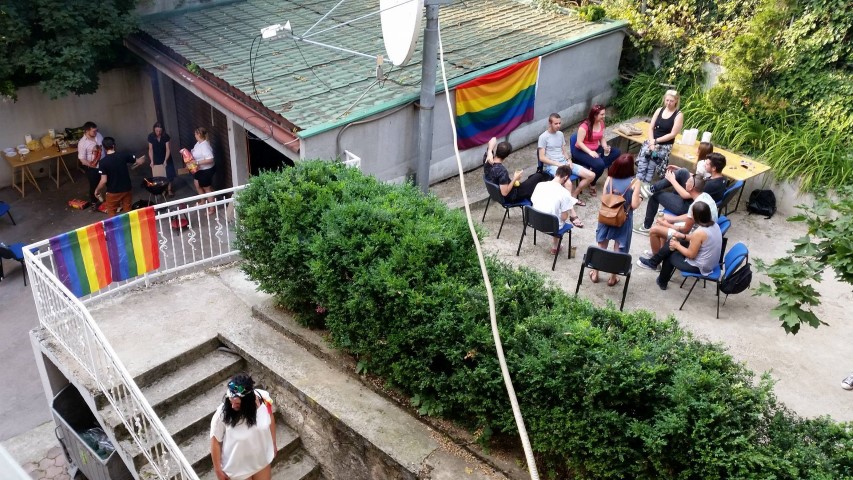
Working with the community also includes the flexibility of working hours and multitasking. On the other hand, the rewards can be found in happy faces, conscious attitudes, the final acceptance of one’s distinctiveness and the opportunity to see all the beauty of difference.
Finally, it seems best if we shared with you some experiences directly from our community!
“I first attended a SOC event when they hosted the drag artist Panti Bliss, at the Chamber Theatre 55, over a year ago. From the beginning of the year I have followed SOC’s work more and I attended almost every event. I like where this is going. I am commending the variety of content and approachability of the team members.” – V.O.
“I attended SOC trainings, which were very helpful to me in my life. Also, I like the gatherings like having a barbecue. What I like the most is that when there are surveys and questions being asked, the team members listen to our responses. Once in a survey I wrote that I couldn’t come to the gatherings because I didn’t have transportation means to get to Sarajevo, or a place to stay in Sarajevo. For the following activities, I was told that I would have secured transportation and accommodation. That is how I recognized that they actually listened to the needs of the community.” – Mol
“I have known about SOC for the past seven years. It is impressive that SOC gathers young people. The topic that I follow a lot is the topic of life partnership – that’s most important for me now. The second most important thing is that we can come together like this.”– Marijana
“I find everything really great. SOC is very important to me, and it has helped me a lot, starting with professional help, that is, visiting a psychologist, as well as accepting myself. You feel a lot better when you are part of a community. These are trustworthy people. I find all the workshops great, but my favourite one was on coming out. The story was spontaneous, some other people outed themselves. I had already known some stories on outing, but this way I saw people going through the same. It was interesting to see all the different ways people outed themselves.” – Alen S.
“In the field of advocating, owing to the initiatives of the Sarajevo Open Centre, we got some laws, like the Anti-Discrimination one, which we can use in the future, with the aim of improving the quality of life of LGBTI persons. One of my favourite events is the Merlinka Festival, since it is a major gathering for activists. The atmosphere is great, and it is a good opportunity to meet new people. I also like educational workshops since I believe that you cannot get enough training and that it is the holy grail of activism. I was personally inspired by some members of the Sarajevo Open Centre. They motivated me and showed me what it means to be an activist, which means a lot to me. I like the School of LGBTI Activism, the Žarana Papić School of Feminism, events like the barbecue get together, as well as the fact that SOC works with institutions. SOC gives an opportunity to people to have a better quality of life.” – Haris Begić
“I first came to SOC two years ago, and I have been on numerous workshops since. My eyes opened for the trans issue – today I know a lot more about trans rights and the LGBTI community. What I find important in SOC’s work is that they helped me in my work and initiatives, like the drag group initiative. They helped me so much to become empowered that I can say that life without SOC would look sad. Everything SOC does is great for the community, for me and those coming after me. SOC helps us help ourselves and others, but it also teaches us about ourselves and others.” – Iwa Farah Durawi
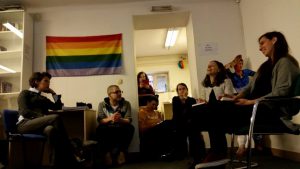 “SOC matters to me because I hang out with people who are going through the same things as I am. It’s a relief. I was recently at a party, and it was great, but it is important to say that for me it is the most important that I know that a safe place like SOC exists, that there is a place where I don’t have to pretend about being a lesbian. Although for personal reasons I cannot always be there, SOC has my support.” – Pot
“SOC matters to me because I hang out with people who are going through the same things as I am. It’s a relief. I was recently at a party, and it was great, but it is important to say that for me it is the most important that I know that a safe place like SOC exists, that there is a place where I don’t have to pretend about being a lesbian. Although for personal reasons I cannot always be there, SOC has my support.” – Pot
In five months (from February to July 2017) around 200 people visited our community events.
We would like to thank everyone for their participation in SOC activities, those who selflessly shared their knowledge and talents and made this movement possible!
For the next 10 years of building the LGBTI community!
Naida Kučukalić, coordinator for working with the LGBTI community at SOC from September 2014 to January 2017
From gatherings and activist activities to playing Bingo and Pictionary
My job included getting to know the community, their needs, and accordingly organising theme or fun gatherings twice a month. Our community is diverse, so are the needs, wishes and desires, and everything was carried out in line with possibilities. We organised evening gatherings on different topics; the LGBT movement, homosexuality in our region, lesbianism and the women’s movement, bisexuality, transgender, transsexuality, religion and queer identity, coming out, and we also talked about sex, sexually transmitted diseases, sex toys, activism, feminism…
We hosted numerous important personages from the Balkans, activists, and people promoting equality in the society in a manner. Those were: Lepa Mlađenović, Boban Stojanović, Marko Šelić Marčelo, Helena Vuković, Biljana Ginova, Zoe Gudović, Neprocjenjiv.A (Mihael and Neda) from Rijeka, Franko Dota, Mima Simić, Alma Selimović, Ana Brakuš, Milan Đurić, Ljiljana Živković, Elma Islamović and many others.
We organised trans group meetings, and a small seminar with trans people from the region, at the request of the trans group from BiH, which they led. We watched films, went to the theatre, of course following queer topics. On two occasions, we took groups to the Belgrade and Podgorica Pride Parades.
We started activities, street and online ones, with limited resources, with an activist group, for IDAHOT, Lesbian Day, Memorial Day for transgender persons who are no longer with us, International Transgender Day of Visibility. These were all activist activities – and I am not talking about posters around the city, which were paid for. We went and took letters by transgender persons to the Federal Parliament and relevant Ministries etc.
In addition to it all, creating and organising all the mentioned events, we also did peer to peer counselling, personally in the premises of SOC or by e-mail. A lot of people contacted us. Some even by phone or text messages. I think it is important to say that even people over 40 called us or came to see us. Some needed a longer time to communicate until trust was established, and they would come later. For a lot of people, it was helpful to come twice a week, talk, pour their hearts out, recharge and get back to the real world. Some started psychotherapy to work on themselves some more.
We also had parents come and see us. Some were only there for support.
We organised barbecues and New Year’s Eve gatherings, for three years in a row. We also organised games such as a Pictionary tournament, Bingo with prizes, with around 50 people, group screenings of Game of Thrones with quizzes and more.
It was a very intense and good period. People came from other towns, not only Sarajevo, some of them to meet people like them for the first time, e.g. from Krajina. There was good energy.
10 yearssoc
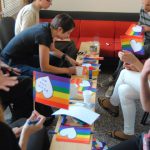 10 years of SOC: Today, there is a small but important group of LGBTI persons that will engage in activism
10 years of SOC: Today, there is a small but important group of LGBTI persons that will engage in activism 10 years of SOC: Violence, gender equality and administrative silence
10 years of SOC: Violence, gender equality and administrative silence 10 years of SOC: Back to Silence – Never Again
10 years of SOC: Back to Silence – Never Again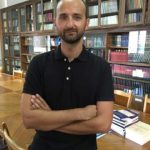 10 years of SOC: How LGBTI Rights and Freedoms were Ushered into Institutions
10 years of SOC: How LGBTI Rights and Freedoms were Ushered into Institutions